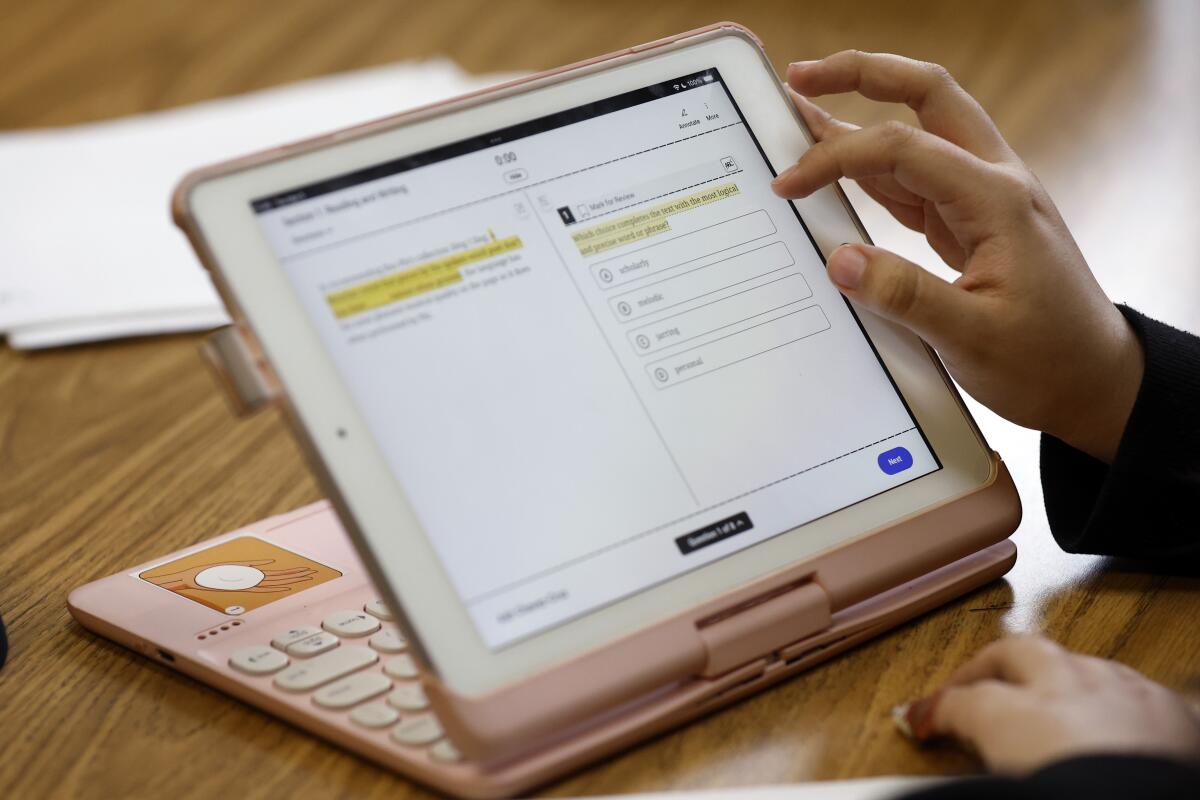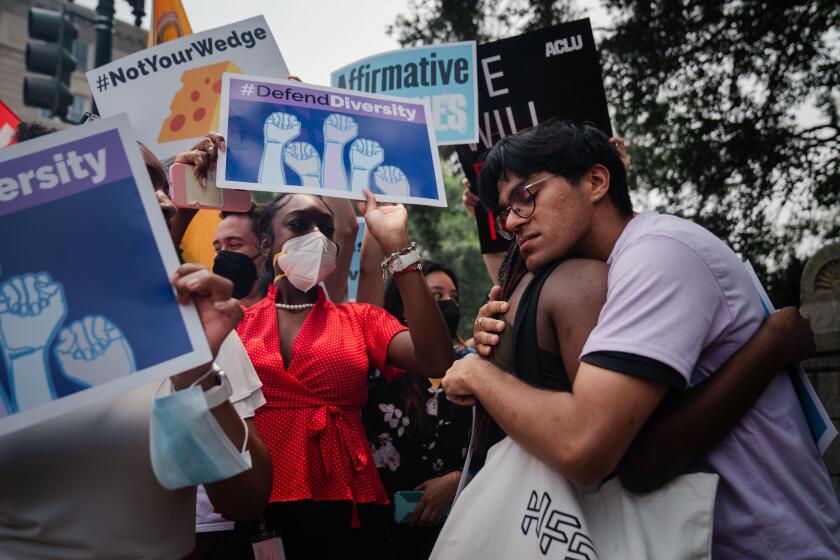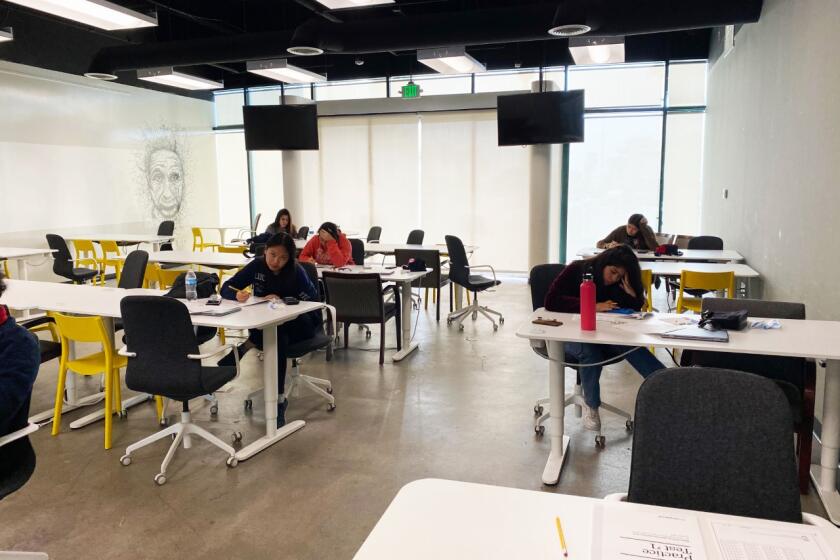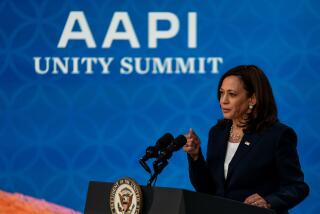Most Asian Americans think SAT but not race is fair to consider for college admissions

Most Asian American adults support use of the SAT and other standardized testing, along with high school grades, in college admission decisions but reject considering race or ethnicity to determine access, according to a new national survey released Wednesday.
The majority also think it’s unfair for colleges to consider an applicant’s athletic ability, family alumni ties, ability to pay full tuition or parents’ educational levels in determining who should get acceptance letters, the survey found.
At the same time, most Asian Americans, Native Hawaiians and Pacific Islanders surveyed believe that slavery, racism and segregation should be taught in schools and oppose individual school boards restricting classroom discussion of specific topics, as some conservative districts have done.
Overall, AAPI adults value higher education not only as a pathway to economic well-being but for teaching critical thinking, fostering the free exchange of ideas and advancing equity and inclusion.
The survey by AAPI Data, a UC research enterprise, and the Associated Press-NORC Center for Public Affairs Research interviewed a nationally representative sample of 1,068 AAPI adults age 18 and older. The poll, conducted April 8-17 in English, Mandarin, Cantonese, Vietnamese and Korean, has a margin of error of 4.7 percentage points.
The poll offers a comprehensive look at attitudes toward education among Asian Americans, who make up a disproportionately large share of students at the University of California and other selective institutions — yet are often overlooked in policy discussions about equity and diversity.
In another major reversal, the Supreme Court forbids the use of race as an admissions factor at colleges and universities.
Several polls have shown that Asian Americans support affirmative action, depending on how the question is asked. A 2022 survey found support at 69% when respondents were asked if they favor programs to help Black people, women and other minorities get access to higher education. But Asian American plaintiffs who led a landmark lawsuit against Harvard University argued that affirmative action policies that use race as a factor in admissions discriminated against them. Last year, the U.S. Supreme Court struck down such race-conscious practices.
In the new survey, the question about using race in admissions, worded without context about whom it would help, drew little support. Asked if they think it is “fair, unfair or neither fair or unfair for colleges and universities to make decisions about admitting students” based on race and ethnicity, 18% of respondents said it was fair, 53% said it was unfair, and 27% said it was neither.
The AAPI Data/Associated Press-NORC survey is among the first to gauge Asian American attitudes on standardized testing and other metrics for college admissions, along with broader questions about the value of education.
“The stereotype of AAPIs might suggest that they care about education only in a narrow way as it relates to economic mobility and hard skills related to job prospects,” said Karthick Ramakrishnan, a UC Riverside professor of public policy and political science and founder of AAPI Data. “This study reveals a more nuanced and fuller portrait, illustrating that AAPI individuals value education ... also for fostering critical thinking and nurturing a more informed citizenry.”
A strong majority — 71% — of those surveyed believe the history of slavery, racism, segregation and the AAPI community should be taught in public schools. A smaller majority, 53%, favor teaching about sex and sexuality — including 72% of AAPI Democrats and 25% of Republicans.
Overall, AAPI adults hold similar views as the general American public about the keys to children’s success: hard work, time spent with parents and which schools they attend. Asian Americans, however, are significantly more likely to believe the neighborhoods they live in are important to educational success — 62%, compared with 49% of all Americans. Ramakrishnan said research has shown that AAPI families are more willing to move to areas with good schools even if it means living in worse housing.
Asian American support for standardized testing comes as several elite universities have restored those requirements for admissions after pausing them during the pandemic. In recent months, Harvard, Caltech, Yale, Dartmouth and the University of Texas at Austin, among others, have reinstated testing mandates.
The University of California has slammed the door shut on standardized testing for admissions, saying no alternative to the SAT can avoid bias based on race, income.
Some institutions say their reviews showed that the testing requirements increase diversity — benefiting applicants with less access to a rigorous high school curriculum, strong letters of recommendation or impressive extracurricular activities. Others have said it’s harder to assess an applicant’s readiness for college work without standardized testing — especially because many educators have reported significant grade inflation since the pandemic.
The University of California and California State University have both eliminated standardized testing requirements for admission.
Although some UC leaders have indicated interest in reviewing the effect of that decision on student outcomes, faculty leaders say there may not be much of an appetite for it. The UC Board of Regents rejected the Academic Senate’s recommendation to retain testing requirements and voted to bar them for admissions decisions.
USC is continuing its test-optional policy — accepting scores from those who wish to submit them but not penalizing those who don’t — and is reviewing whether to continue that course.
Frank Xu, a San Diego parent of a high school sophomore and an MIT student, said he opposed UC regents’ decision to nix testing mandates and believes that the preponderance of research shows that test scores highly correlate with college success.
“I’m all for research-based decisions, and I felt that at UC, it was a completely political decision to ignore the faculty senate,” he said.
But some Asian American students say testing is an unfair factor in admissions decisions.
At Downtown Magnets High School, students Rida Hossain and Shariqa Sultana said their families were not able to afford test prep, with annual incomes of less than $30,000 and relatives in Bangladesh to support.
“Standardized testing doesn’t portray a student’s capacity for how they’ll perform in higher education, because in the classroom, they’ll be doing a lot of essay writing, research, collaboration and projects that wouldn’t necessarily be put into a multiple-choice exam,” Shariqa said. “How you actually perform in class and your extracurriculars are a better metric than one test that determines your entire future.”
Ramakrishnan said there are several reasons why many Asian Americans support standardized testing. The majority are immigrants from China, South Korea, India and other countries that use such tests for college admissions, he said. They are accustomed to a system of high-stakes testing and see it as an equitable way to determine college access, compared with wealth or political connections.
The survey backs up that point, showing that 70% of AAPI respondents who are immigrants back testing, compared with 56% of those born in the United States. A plurality of those surveyed, 45%, said it was fair to consider personal experiences with hardship or adversity.
But 69% of those surveyed said legacy admissions — preferential treatment for children of alumni — was unfair, while 48% oppose consideration of an applicant’s ability to pay. A majority, 54%, don’t think it’s fair to consider whether applicants are the first in their family to attend college.
More to Read
Sign up for Essential California
The most important California stories and recommendations in your inbox every morning.
You may occasionally receive promotional content from the Los Angeles Times.













